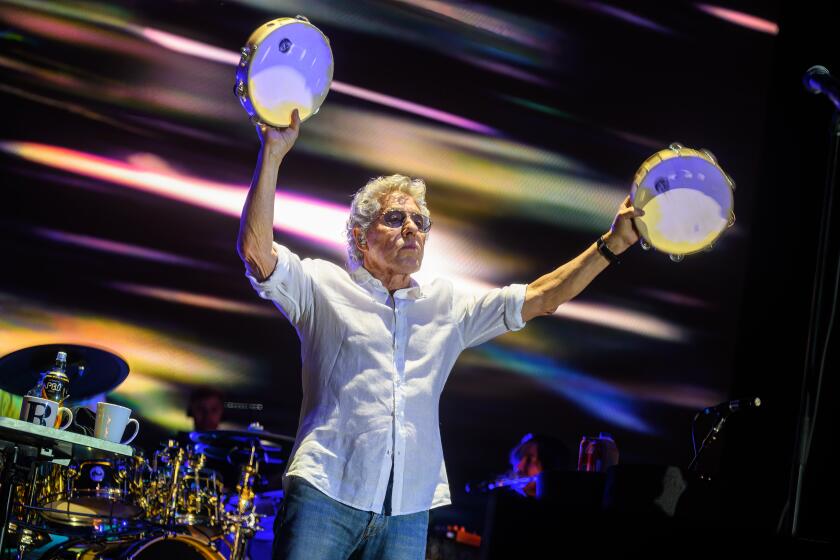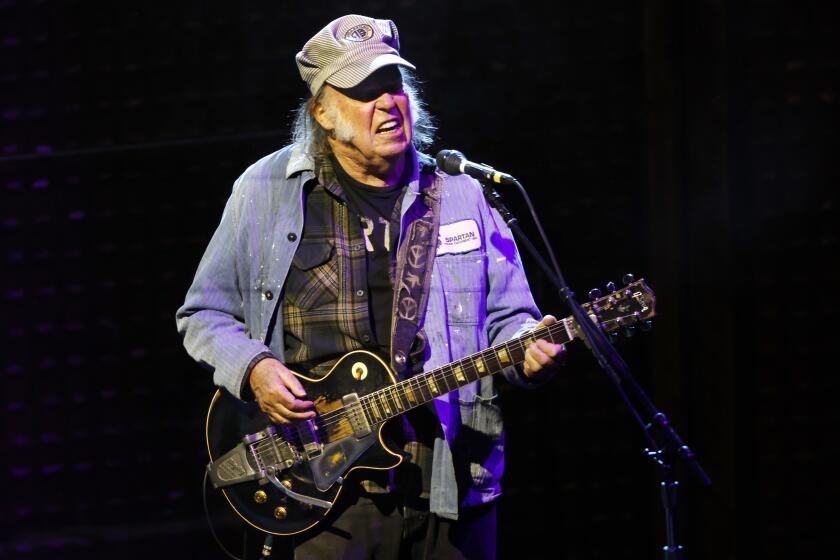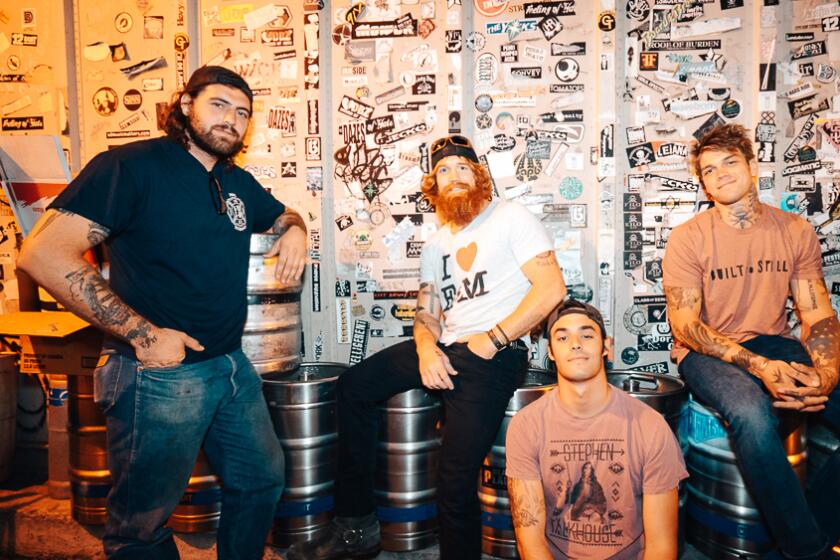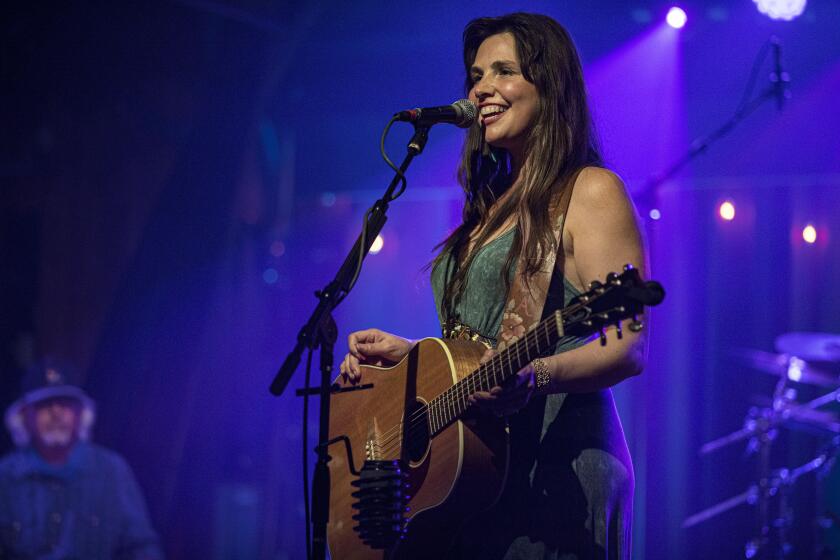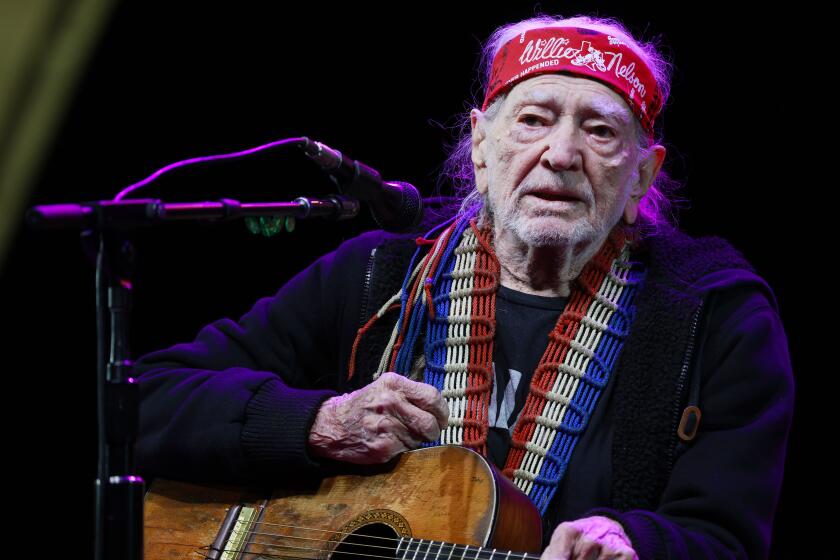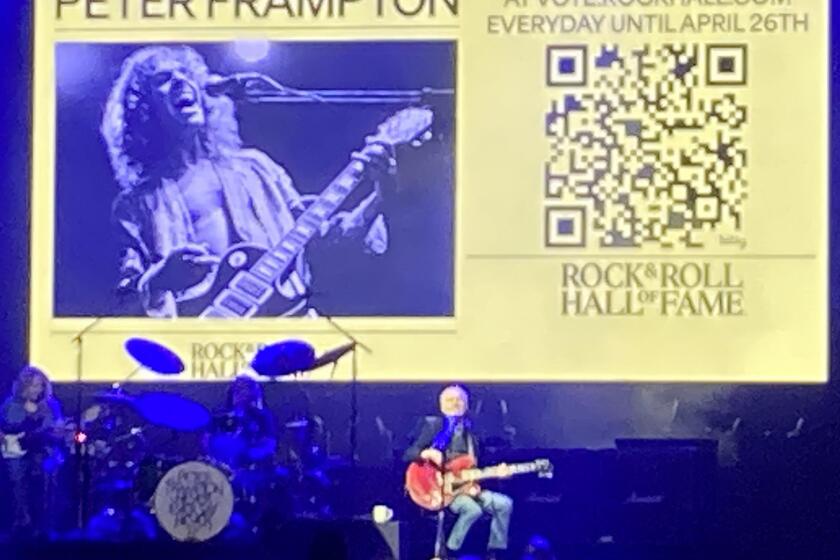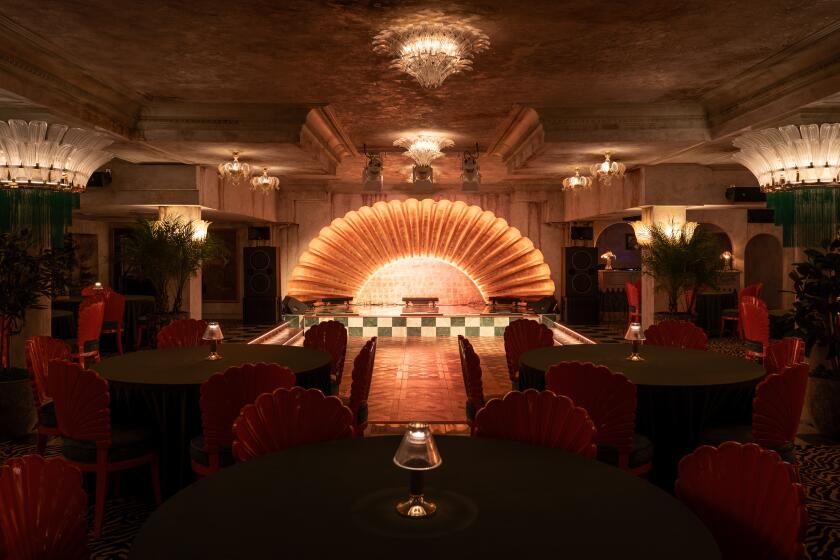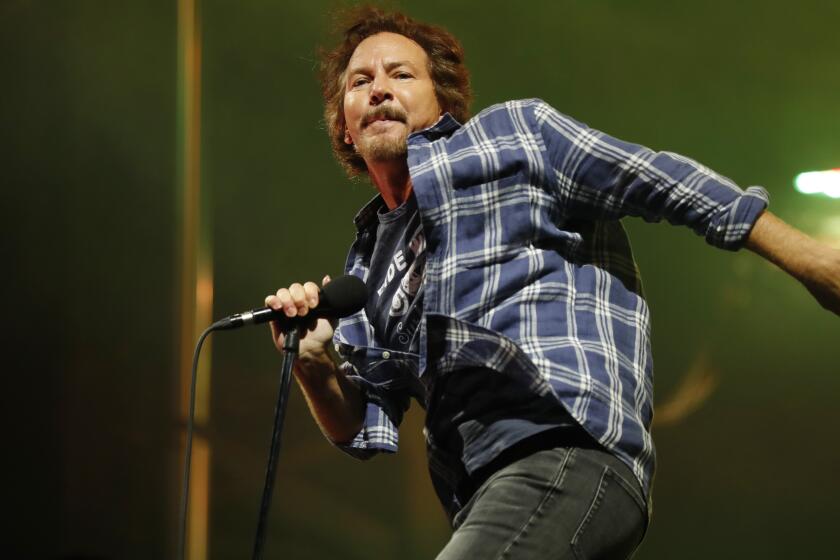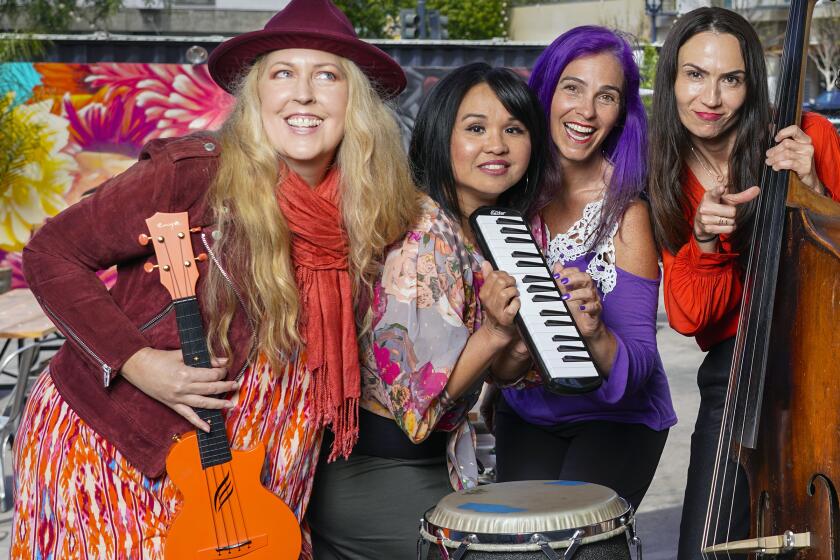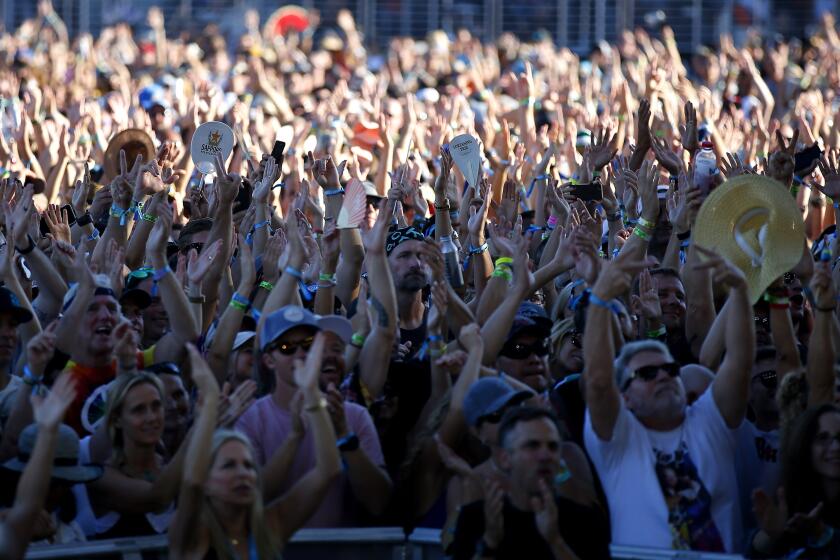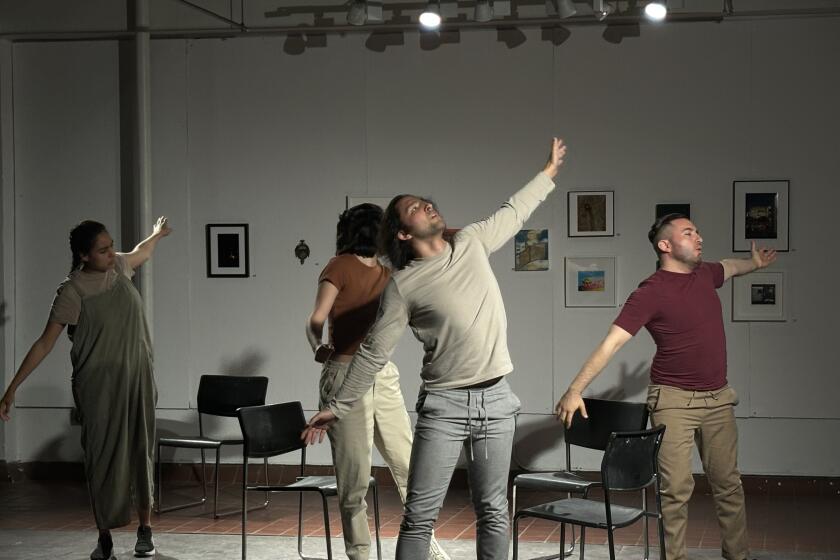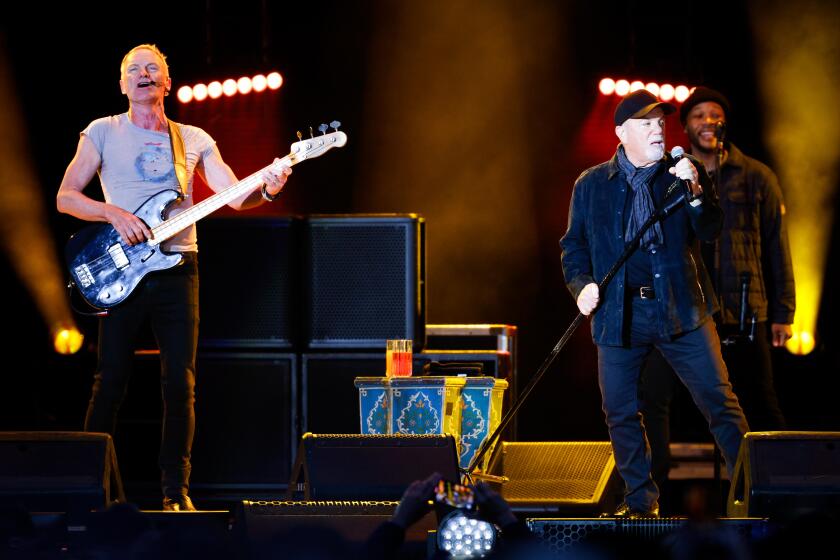Pete Townshend of The Who reflects on ‘Tommy’ at 50, his band’s new album and not dying before he gets old
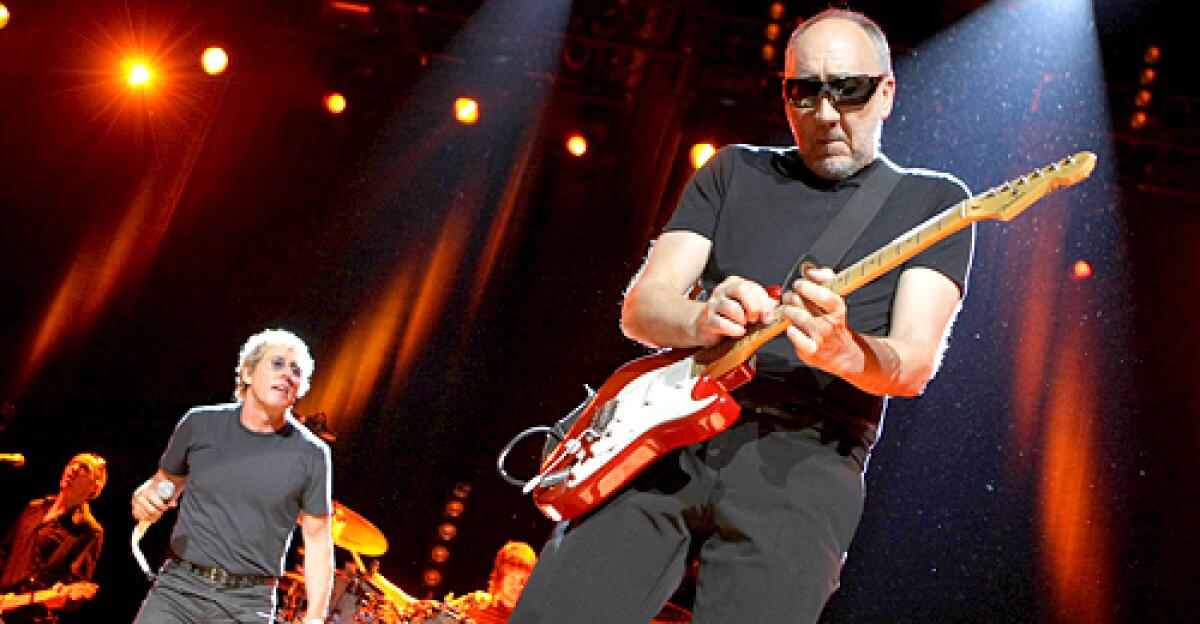
‘I am getting near the end of life,’ says Rock & Roll Hall of Famer Pete Townshend of The Who, ‘and I still haven’t managed to properly process where a lot of the darkness in ‘Tommy’ came from’
Pete Townshend was barely 20 years old when he and The Who recorded his classic 1965 song of youthful independence, “My Generation,” with its defiant declaration: “Hope I die before I get old.”
How does he feel today, 54 years later?
“I know all old people say this, but I still feel young,” said Townshend, who has two San Diego appearances set for next week.
He performs Wednesday with The Who at Viejas Arena, one of the stops on the fabled English rock band’s first-ever orchestral tour. On Monday, Townshend will appear at La Jolla’s Mandell Weiss Theatre as part of an event being billed as “The Who’s ‘Tommy’ — A Staged Concert Benefiting La Jolla Playhouse,” featuring members of the original Broadway cast.
The Playhouse staged the 1992 world premiere of the hit musical production of “The Who’s ‘Tommy’.” After moving to Broadway, it went on to earn five Tony Awards in 1993, including one for Townshend and one for director Des McAnuff, who will also participate in Monday’s benefit here (and is interviewed today by Union-Tribune theater critic James Hebert).
But that was then, and this is now. And feeling young while looking your age can be a disorienting experience, as The Who’s creative mastermind readily acknowledged.
“When I look in the mirror or take a selfie, I am shocked. I am old,” Townshend said.
“Truth is, in some ways, I look better at 74 than I sometimes did at 24. But I am certainly old,” he elaborated. “My health and my stamina are good. The word ‘old’ in the context of ‘My Generation’ was one that signified the Establishment of the day, not old people. I would never have said, for example, ‘I hope I die before I get like John Lee Hooker, Ella Fitzgerald or Duke Ellington.’ I didn’t want to get old — before my time — like people in government, leaders, the rich, the aristocracy. I didn’t despise those people, I just didn’t want to be like them.
“Now, at 74, I am accepted by the Establishment and many of its principals are much younger than me. So what I feel about all this today is standing on its head.”
With his 75th birthday looming next year, Townshend is forging ahead on several fronts.
The Who’s all-caps MOVING ON! tour kicked off its North American spring leg on May 7, followed by a fall leg that began Sept. 6. In between came a single hometown London concert at Wembley Stadium. The tour is the first with an orchestra in the history of the English band, which Townshend has led since its inception in 1964.
The Who’s new album, the all-caps “WHO,” is due out Dec. 6. It will be the group’s first collection of new songs since “Endless Wire” in 2006 (two live albums were released in the interim.) A 2020 tour of the United Kingdom kicks off March 16. Townshend recently announced that The Who will perform at the New Orleans Jazz & Heritage Festival in 2020, a year after Who singer Roger Daltrey’s bronchitis caused the band to cancel its 2019 performance at the New Orleans festival.
For good measure, Townshend will perform Oct. 26 at UCLA’s Royce Hall as part of an orchestral concert of “Animal Requiem,” a composition by his longtime partner, Rachel Fuller. Other guest artists at the concert include tenor Bruce Sledge, soprano Caroline McKenzie, former San Diego singer-songwriter Jewel and actress Jane Lynch, who will narrate.
Now sometimes called The Two, The Who pairs Townshend and Daltrey with their longtime touring band, which includes drum dynamo Zak Starkey (son of Ringo Starr). Original Who bassist John Entwistle died in 2002, 24 years after the 1978 death of manic Who drummer Keith Moon. A recurrence of Daltrey’s bronchitis caused the band to cancel its late September shows in Dallas and Denver. The Who’s next scheduled concerts are Friday and Saturday at the Hollywood Bowl.
Townshend recently consented to an in-depth interview with the Union-Tribune, but requested it be via email. Here is that conversation. sandiegouniontribune.com/entertainment/music
Q: It’s been 50 years since The Who’s “Tommy” was released and 27 years since the “Tommy” musical debuted at the La Jolla Playhouse. How has your view of “Tommy” changed?
A: My intention was to write a story of spiritual awakening. The setting in the immediate post-war years meant that the character “Tommy” was one of us, the so-called Baby Boomers. We may have been blessed with a quiet life in some ways, but as children many of us had the most awful experiences, and that came out in the story. Today I am finding it much less easy to just burst into twittering psychobabble about it all. I am getting near the end of life, and I still haven’t managed to properly process where a lot of the darkness in “Tommy” came from.
Q: In our 2007 interview, you told me: “I had worked in theater before I worked with Des (McAnuff), but my experience with him was special. Commercially the success of “Tommy” changed my life, and not entirely for the better. It took me some time to get used to making so much money without having to stand on a stage myself; I went a bit crazy.” What specifically did Des bring to the equation that made it special and different from your previous theater experiences?
A: He worked as a dramaturge, digging into the surface of the story and using what was there without unnecessary embellishment. We also had the services of the truly great dramaturge Robert Blacker (who sadly passed away a few weeks ago). The (1973 “Tommy”) film by Ken Russell had taken several swerves and added sequences that were not on the album. These were pretty much all dropped for La Jolla. We only added one new piece of music to the La Jolla production, a short piece where Sally Simpson tries to engage Tommy in conversation, to no avail. For New York, I wrote “I Believe My Own Eyes” to explain the breakdown of the marriage of Tommy’s parents.
Q: You also told me in our 2007 interview: “I was very unhappy that ‘Tommy’ on Broadway was called ‘The Who’s Tommy’.” From an authorial point of view, ‘Tommy’ is my story, no one else’s.” How easy, or difficult, was it to let Des (McAnuff or anyone else involved, for that matter) help re-shape “Tommy” for the musical stage? And how much were you willing to change your vision of “Tommy” to help it best adapt to the Playhouse stage and then on Broadway?
A: Even the producer of the original “Tommy” album, Kit Lambert, tried to add shades to “Tommy” that I felt were unnecessary. Indeed, in 1971, he wrote his own movie script (which was very similar to the one produced later by Ken Russell). I have never been precious about the way the story is presented anew. There is now a set theater script produced by Des and myself, and interpreters are supposed to stick to it, but creative people in theater always want to fix things that aren’t broken. Who knows what might happen if it is ever made into another movie?
Q: Paul Simon pointedly told me that the New York theater establishment regarded him as an unworthy outsider when he brought his 1998 musical, “The Capeman,” to Broadway for what proved to be a very short, costly and ill-fated run. Obviously, “Tommy” fared much, much better on Broadway and you won a Tony Award. Were you, too, initially regarded warily by the Broadway establishment, even with the imprimatur of Des, the Playhouse, the Pace Theatrical Group and Dodger Productions?
A: I think Paul Simon is a genius. He is highly respected by the entire spectrum of the New York arts scene. I repeat that with Des and his team I felt in good hands; I was ready to do what they suggested. Roger Daltrey — on the other hand — was very uncertain about the direction we took.
Q: I ask because, in a 1993 interview, you told me: “I think Broadway has embraced the team that made “Tommy,” but I don’t know if they embraced me as generously as I would’ve wished. I only tied with “Kiss of the Spider Woman” (for the Tony Award for best musical score), which means half the votes were against me… I don’t believe the theatrical establishment at large were, or are, convinced that “Tommy” on Broadway is a good thing. I know a lot of people in rock don’t think it’s a good thing. But for the people who go see it, the feeling they get is an affirmation.” Do you think Broadway will welcome you back now with open arms, should you wish to return?
A: I’m surprised that in 1993 I was thinking that way. I was made to feel very welcome in New York. I also loved “Kiss of the Spider Woman” and it deserved its success. The theatrical establishment — across the world — has its own tastes and preferences. “Tommy” was not meant to conquer Broadway, merely to fit in. The landscape now is very different, with dozens of rock-based plays doing well. Yes, I think we will be welcomed. And for the record, a revival of “The Kiss of the Spider Woman” might be timely, too.
Q: Which leads into my next question: Between 2005 and 2017, there have been a few small stage productions of “Quadrophenia.” With or without Des, have you considered adapting “Quadrophenia” for the musical stage, and how might you do so?
A: Short answer is, yes, I have, and sadly none of them have really worked. Musically, it towers above most other music I have written. My hope is that I can compose such powerful music again.
Q: In 1993, you and your band performed a benefit for the Playhouse at San Diego’s Symphony Hall. In 2001, you performed two unaccompanied solo shows at the Playhouse itself, as benefits for the Playhouse (both released as double-CDs). You are set to return there again for the Oct. 14 staged performance of “Tommy.” How did this Oct. 14 event come about, and what might your involvement (which is being billed as a “special guest appearance”) entail?
A: I will join the throng and, hopefully, not get in the way. I will be there, that’s what’s important. These are my people, my allies, friends and colleagues. I truly adore them all, and I sincerely hope one day to work at La Jolla again.
Q: The Who perform an arena show in San Diego two days later, on Oct. 16, as part of your orchestral tour. How is the tour going, and how do you change your guitar playing style, or your stage volume, to mesh with an orchestra? What do you have in your (on-stage) monitor mix on this tour that is different from your monitor mix for a regular Who tour?
A: Come and see and you will get your answers. I don’t change much, but I do respect the orchestra. If I play more quietly that will be for Roger. I still have my explosions…. My monitor mix is pretty much the same as ever, but with some orchestra added if I need it. Remember we have a conductor. In some ways, I am driving blind.
Q: You did not write The Who’s songs for an orchestra, although The Who’s MOVING ON! tour is not the first time they have been presented in an orchestral setting. What has surprised and pleased (or, perhaps, concerned) you about presenting them this time around in such an expanded instrumental format?
A: “Tommy” has been orchestrated before. Lou Reizner and Lou Adler (the founder of Ode Records) created a very credible and respectable version in 1975. David Campbell did the orchestrations for the tour, though I did one for (the song) “Hero Ground Zero,” which is featured (in concert) from the forthcoming new Who album. I had no concerns at all, apart from logistical and technical. Roger promised me everything would run smoothly, and so it has. I am challenged by doing this, but also exhilarated. I was suffering from “Groundhog Day” with our old set. I can’t really do better (with the old set) than I did at (the) Desert Trip (festival in Indio) in 2016.
Q: I hope Roger is swiftly recovering from his bronchitis. How is he?
A: He is going to be OK. The main thing is that his voice is unaffected it seems.
Q: The new Who album is due out Dec. 6. What can you tell me about the new album, which Roger has declared is The Who’s best since “Quadrophenia,” and will there be a 2020 tour to follow its release?
A: This album has no concept, other than I wanted to write songs that might appeal to Roger and give him some vehicles for his voice — which I feel is better than ever. That proved to be tricky in the end, because Roger heard the songs as solo songs, which I understood, but I was confused. The themes are hopefully ones that give both Roger and me something to stand by and speak for. That means the songs are about getting older in pop music and in life and love. There are also songs that align with activism in some ways, especially the way we in the world respond to national and international tragedies. It sometimes seems to me that we have been “fooled again.”
Q: In 1989, you told me: “I might be wrong, but I believe right now that there is an age at which you cannot do the rock ‘n’ roll thing. And we don’t know yet what age that is. But, sooner or later, you know it’s going to go wrong. So, it’s like, ‘When will the end come?’ ” Then, you elaborated, saying: “We have to define our limits; I’m surprised at what we’ve been able to do this time. The Stones are never going to stop, and if The Who lives another 25 years, I’m sure we’ll be tempted to get up there and party down. And that might be the day somebody has a heart attack on stage. I have to be honest. It’s quite possible that I’ve had a heart attack on this tour! Nobody’s done an EKG on me as I’ve walked off stage. And, you know, adrenaline is a very powerful drug.”
You then continued: “So, it’s whether or not it repels you; that’s what important. It’s about entertainment, and you can’t be entertained by people who are repellent because of their age. We can go on stage with 16 layers of makeup, and I’m sure on the video (screens that flank the stage) we look two, three, maybe five or 10 years younger than we really are. The people we are really confronted with are the people in the front row who can see the lines, can see the thinning hair and see the makeup. Now if you can make them happy, and if you can mainly convince yourself, I suppose, that you’re happy with it, then you can go on. But I think it’s still a real problem. There has to be an end to it; rock isn’t like blues or jazz.” Here we are, 30 years later. How would you amend that statement now?
A: I don’t think the issue is as much about age as about relevance. Millennials think differently to Boomers. Rock, like jazz and blues has a legacy role now. So what I do on stage isn’t the issue, it’s why I am there in the first place, and why are people paying for me to be there? About a quarter of our concert attendees are now below the age of 40. They really don’t seem to be repelled! I hope they understand that I’m not up there to try to prove anything. That’s done. I’m there to earn my pension. I have grandchildren. Sick relatives. Charities I support. All that stuff.
Q: In 2007, you told me: “I don’t feel right unless I spend a few moments of each show two feet in the air. How absurd is that for a man of 61? How can it possibly mean anything, except to someone else who is 61 and needs a vicarious validation?” It’s 2019 and you are now on the road again, at 74. Do you still need validation, and in what form?
A: It seems I do. I still like to spend a few moments up in the air, as far as I can jump. It’s what we in the U.K. call “Dad dancing.” Horrible to look at it, but joyous to do.
“The Who’s ‘Tommy’ — A Staged Concert Benefiting La Jolla Playhouse”
With: Members of the original Broadway cast, with special appearances by Pete Townshend and Des McAnuff
When: 7:30 p.m. Monday
Where: Mandell Weiss Theatre, La Jolla Playhouse, 2910 La Jolla Village Drive, La Jolla
Tickets: $500 (includes concert seating and cast after-party, $750 (includes upgraded concert performance seating and cast after-party) and $1,000 (includes pre-show reception, premium concert performance seating and cast after-party)
Phone: (858) 550-1010
Online: lajollaplayhouse.org/tommy/
The Who MOVING ON! tour
When: 7:30 p.m. Wednesday
Where: Viejas Arena, 5500 Canyon Crest Drive, San Diego State University
Tickets: $88-$208, plus service charges
Online: ticketmaster.com
Get U-T Arts & Culture on Thursdays
A San Diego insider’s look at what talented artists are bringing to the stage, screen, galleries and more.
You may occasionally receive promotional content from the San Diego Union-Tribune.

